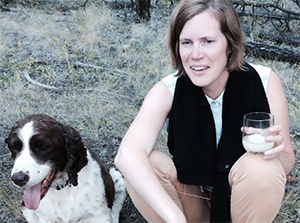The Soundscapes of Inevitability:
Kate Kennedy in Conversation
with Genevieve Lehr

Canadian editor and poet Kate Kennedy talks with Genevieve Lehr, winner of the Open Season Awards (poetry category) for 2017 with her poem, “two tarantulas appear in the doorway during a thunderstorm.”
Read what contest judge Sina Queyras had to say about Lehr’s winning poem.
One of my favourite aspects of this poem is your use of internal rhyme (crescendoing, undertow / sorrowful…tarantulas). I’d be curious to know whether most of that happens in a first draft for you, or whether you strengthen it or tone it down significantly in your revisions.
Second, I also really liked the way you used the title to establish most of the setting and background, so that the poem begins with the stage already set. Is this something you played with as you were writing? Is it a device you’ve used other times in your work?
First, yes, the internal rhyme, as in many of my poems, appeared in the first draft. When I wrote “crescendoing,” the soundscape that followed had a kind of inevitability in it. Often, the sound/music of a poem presents itself first, then plays its way into words, phrases, lines, etc. I tune in, so to speak, and listen deeply in the stillness for the poem to begin assembling itself and emerge. Sometimes, poems come to me without any titles to announce their arrival, other times, like this one, the title arrives first.
I’d love to know a little bit more about the genesis of poem in terms of where you/the speaker is that occasioned the arrival of a pair of tarantulas, or whether it was imagined.
This poem is just that. I was house sitting a remote rustic villa at the edge of a jungle on the west coast of Mexico (accessible only by boat) this past summer during the rainy season. It’s the time of year of tropical storms, intense heat and humidity, and the place teems with critters one rarely sees at other times of the year. So, there they were on the doorstep, and my reaction was fear. Then, as I sat looking at them wondering what to do, I remembered a friend telling me how sensitive and shy they are. I turned my attention to my hands sitting on my lap and the poem arrived out of that time in the past where a shy, sensitive child was shamed for having dirty hands. The tarantulas arrived as mysteriously as the poem did from a deep, unseen, world. A gift.
You were one of the winners of the Malahat’s 2015 Long Poem Prize. First, belated congratulations! Second, I’m curious to know how contests fit into your process of writing and submitting work places. Does a contest ever spur new writing or do you tend to work with what’s on hand?
Thank you. It’s amazing to me that I won these two contests since I rarely enter any, and it’s not often I even submit work anywhere. During the past few years I’ve been more inclined to send work out, usually with the encouragement of writer friends.
Further to that, as someone who has had recognition for both long(er) and short(er) poems, what can you tell me about how you approach length in your work? Do long poems suggest themselves to you from the outset, do they grow out of shorter pieces?
I’m still trying to figure that one out. I can say though that some poems from the outset begin with a certain energy/urgency and end when the energy is used up. I don’t always know which ones that will be, so I have to be patient and really resonate with what is going on in the poem. If the shorter poem doesn’t settle, I begin to suspect “longish” poem. Some of my long poems do seem to grow out of shorter poems, though not all the time. At other times, I have a title in mind and a general idea of what I want to write, but there are always surprises, and definitely no guarantees. Having said all of that, poems seem to be rather mysterious and trickster-like most of the time, existing on the periphery of things, arriving “on the threshold” when least expected.
Finally, do you have any long-term projects in the works right now, whether a new manuscript or otherwise?
My long-term project is quite simply to write. In and during my process of gathering and writing, themes/motifs begin to emerge from the poems, rewrites and edits begin, more poems come out of resonance with other poems, and then manuscript time is ready to begin. Well, something like that. A kind of spontaneous, focused, open, attentive affair.

Kate Kennedy
* * * * * * * *









